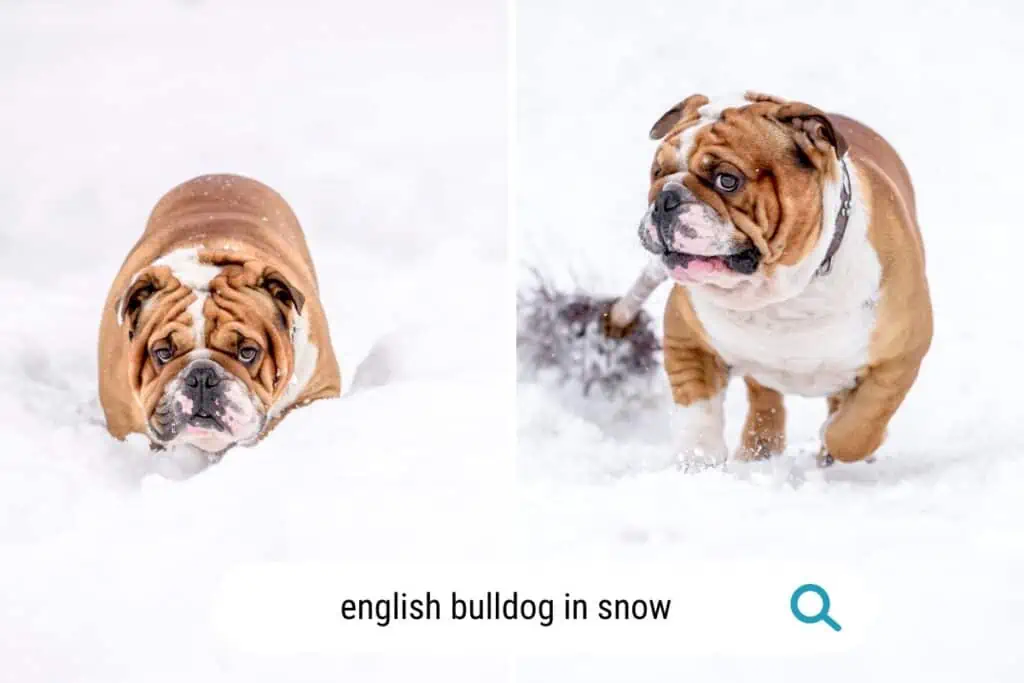Do English Bulldogs Like Snow? [Safety Guide]
English bulldogs are a beloved breed known for their wrinkly faces, stocky build, and friendly personalities. However, when it comes to winter weather and snow, some may wonder if these pups are equipped to handle the cold. While English bulldogs may enjoy playing in the snow, it’s important to note that they are not built for it.
Despite their love of outdoor activities, English bulldogs are not well-suited for cold weather. Their short, stocky bodies and thin coats make them susceptible to hypothermia and frostbite when exposed to prolonged periods of cold temperatures.
Additionally, their brachycephalic (flat) faces can make it difficult for them to breathe in cold air, leading to respiratory issues.

While English bulldogs may enjoy frolicking in the snow for short periods of time, it’s important for pet owners to monitor their time spent outdoors and ensure they are properly dressed for the weather. With proper precautions and care, English bulldogs can still enjoy the winter months without compromising their health and safety.
Can English Bulldogs Handle Snow?

Physical Characteristics of English Bulldogs vs Snow
English Bulldogs are a breed that originated in England and were initially used for bull-baiting. They are a medium-sized breed that typically weighs between 40 and 50 pounds. Bulldogs have a short, stocky build, with a wide head and short snout. They have a thick coat of fur, which can vary in color.
While English Bulldogs are known for their tough and resilient nature, they are not built for extreme weather conditions, such as snow. Their short snouts and narrow airways make it difficult for them to breathe in cold air, which can lead to respiratory problems. Additionally, their short legs and heavy bodies make it challenging for them to walk through deep snow.
Why English Bulldogs May Struggle in Snow
English Bulldogs are not adapted to cold weather, and they may struggle to regulate their body temperature in snowy conditions. Their thick fur coat may provide some insulation, but it is not enough to keep them warm in freezing temperatures. Additionally, their short legs and heavy bodies make it difficult for them to move through deep snow, which can cause them to tire quickly.
Furthermore, English Bulldogs are prone to certain health issues that can be exacerbated by exposure to cold weather. For example, they are susceptible to respiratory problems, which can be worsened by cold air. They are also prone to joint problems, which can be aggravated by walking on slippery or uneven surfaces, such as snow and ice.
In conclusion, while English Bulldogs may enjoy playing in the snow for short periods, they are not built for prolonged exposure to cold weather. Their physical characteristics and susceptibility to certain health issues make it challenging for them to handle snow and other extreme weather conditions. It is important to monitor your bulldog’s behavior and health when exposed to cold weather and take necessary precautions to keep them safe and comfortable.
Precautions for English Bulldogs in the Snow
| Precaution | Explanation |
|---|---|
| 1. Invest in Dog Booties | Protect your English Bulldog’s paws from the cold, ice, and salt by using dog booties. This will prevent frostbite, irritation, and cracked paw pads. |
| 2. Use a Dog Coat | Due to their short coat, English Bulldogs may need extra insulation when out in the snow. A well-fitted dog coat will help maintain their body temperature and keep them comfortable. |
| 3. Monitor Time Outdoors | Limit the amount of time your English Bulldog spends outdoors in snowy conditions. Prolonged exposure to cold temperatures can lead to hypothermia or frostbite. Check for signs of discomfort and bring them inside promptly. |
| 4. Keep Them on a Leash | Snowy conditions can affect visibility and make it difficult for your dog to navigate. Keep your English Bulldog on a leash to prevent them from getting lost or wandering onto dangerous surfaces, such as frozen bodies of water. |
| 5. Wipe Their Paws | After each walk, wipe your English Bulldog’s paws with a warm, damp cloth to remove snow, ice, and any chemicals or salt that may have accumulated. This will prevent irritation and ingestion of harmful substances when they groom themselves. |
| 6. Provide a Warm Resting Spot | Make sure your English Bulldog has a warm, dry place to rest after spending time in the snow. Provide them with a comfortable bed or blanket to help them warm up and avoid chills. |
| 7. Check for Snow Buildup | Regularly check your English Bulldog’s paws, coat, and skin folds for accumulated snow or ice. Gently remove any buildup to prevent discomfort and potential frostbite. |
| 8. Avoid Overexertion | English Bulldogs can have difficulty breathing in cold weather due to their brachycephalic nature. Monitor their activity levels and encourage breaks to avoid overexertion and respiratory distress. |
| 9. Provide Fresh Water | Ensure that your English Bulldog has access to fresh, unfrozen water at all times. Staying well-hydrated is crucial for maintaining their body temperature and overall health in cold weather. |
| 10. Watch for Signs of Discomfort | Be attentive to your English Bulldog’s behavior and body language when spending time in the snow. Signs of discomfort or distress may include shivering, lethargy, whining, or reluctance to move. Bring them inside if you notice any concerning signs. |

Do English Bulldogs Like Snow?
English bulldogs are a popular breed of dog known for their friendly and affectionate personalities. However, when it comes to snow, English bulldogs are not built for it. While some dogs may enjoy playing in the snow, English bulldogs are not one of them.
These dogs have short, stocky legs, and a heavy build, which makes it difficult for them to move around in the snow. Additionally, they have a short snout, which can make it difficult for them to breathe in cold weather (Cornell University).
While English bulldogs may be curious about the snow, they are not likely to spend much time outside in it. If you do take your English bulldog outside in the snow, it’s important to keep an eye on them and make sure they don’t get too cold or tired.
Overall, while some dogs may enjoy playing in the snow, English bulldogs are not one of them. Due to their physical build, they are not well-suited for cold weather and may struggle to move around in the snow.
How to Keep English Bulldogs Safe in Snow

Precautions to Take
English Bulldogs are not built for cold weather, particularly snow. However, if you live in an area where snow is common, there are a few precautions you can take to keep your furry friend safe and healthy.
- Limit outdoor time. English Bulldogs should not be left outside for extended periods of time in cold weather, particularly if there is snow on the ground.
- Be mindful of ice. Bulldogs can slip and fall on ice, which can lead to injuries.
- Keep them on a leash. Snow can mask scents and make it difficult for your Bulldog to find their way back home.
- Protect their paws. Snow can cause irritation and frostbite on your Bulldog’s paws. Consider getting them booties to protect their feet.
Tips for Keeping English Bulldogs Warm and Dry
Even if you take precautions, your Bulldog may still be exposed to snow and cold weather. Here are a few tips for keeping them warm and dry:
- Dry them off. After your Bulldog has been outside in the snow, be sure to dry them off thoroughly to prevent them from getting sick.
- Dress them in a coat. Consider getting your Bulldog a coat to wear outside in the snow. This will help keep them warm and dry.
- Keep them inside. The best way to keep your Bulldog safe in the snow is to keep them inside where it’s warm and dry.

Family Dog Expert Author
Hi there! I’m Stuart, a devoted dog lover and family dog expert with over a decade of experience working with our furry companions. My passion for dogs drives me to share my knowledge and expertise, helping families build strong, loving bonds with their four-legged friends. When I’m not writing for SirDoggie, you’ll find me hiking, playing with my beautiful dog, or studying music.
